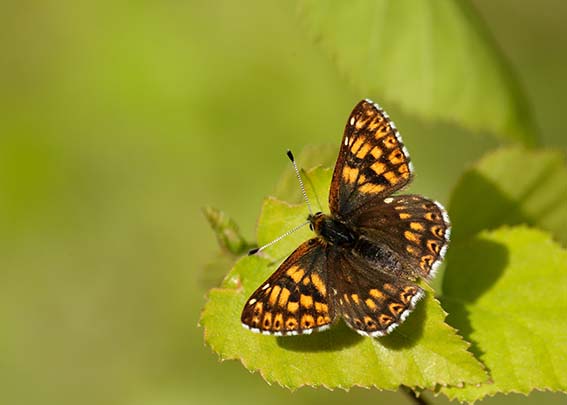A rare butterfly is being given a chance to thrive thanks to the owner of a woodland in Hampshire, Tilhill Forestry and a Countryside Stewardship grant that is allowing coppicing to continue on the 70-acre site.
The site near Stockbridge, which is believed to have been Hazel coppice since the time of Henry VIII, was bought by the owner Catherine Antcliff 18 months ago. It is home to the Duke of Burgundy butterfly and the caterpillars of these butterflies depend on the Cowslips, Common Dog-violets and the Primroses that grow following coppicing of hazel.
Tilhill Forestry Senior Forest Manager Stephen Taylor explains: “The woodland owner’s main objective is to maintain and improve conditions for the butterfly population by continuing the coppice ‘rotation’. Hazel is cut by hand and the cut material is used to produce hurdles while the lower grade material is bundled into faggots that are used to stabilise river banks. The cut hazel ’stools’ are left to regenerate for around seven years prior to the next cut. The area is heavily populated with Fallow, Roe and Muntjac deer that can devastate the next crop through browsing. It is vitally important to protect the new growth from deer damage and the Countryside Stewardship grant assists with costs.
“Compared to in the past, there is a limited market for hazel coppice so it is important to maintain the quality of the coppice to attract the coppice workers. One of our workers has worked in the wood for 30 years and has cut some areas three times.”

Conservative MP for Romsey and Southampton North, Caroline Nokes, has ‘adopted’ The Duke of Burgundy butterfly, one of the UK’s most threatened butterflies, in a bid to boost its numbers. The Duke of Burgundy has declined by 40% since the 1970s, but wildlife charity Butterfly Conservation (BC) has helped landowners across Hampshire to turn the county into a stronghold for the butterfly. Ms Nokes has agreed to work with BC as a ‘Species Champion’ for the Duke of Burgundy.
BC’s Conservation Officer, Rachel Jones, said: “The Species Champion project is about MPs promoting species, habitats and positive management within their constituency and in Parliament. There are now 42 MP Species Champions across England and we’re really grateful that Ms Nokes has chosen to support BC and in particular, raise awareness of this declining butterfly.”
She said: “I’m thrilled to be working with BC to raise the profile of this rare butterfly and I’m hoping that by being a ‘Species Champion’ I can contribute to securing its future in Hampshire. “We’re very lucky to be the national stronghold for this lovely butterfly and it was eye-opening to see how important it is for woodland managers like Tilhill Forestry to work together with others – not just on their land, but across an entire landscape – to conserve some of our rarest wildlife.”

Middle Image shows woodland owner Catherine Antcliff with MP Caroline Nokes, Forest Manager Stephen Taylor and Dr Dan Hoare, Head of Regions for Butterfly Conservation.
Bottom image: Duke of Burgundy Butterfly. Credit Keith Warmington.



